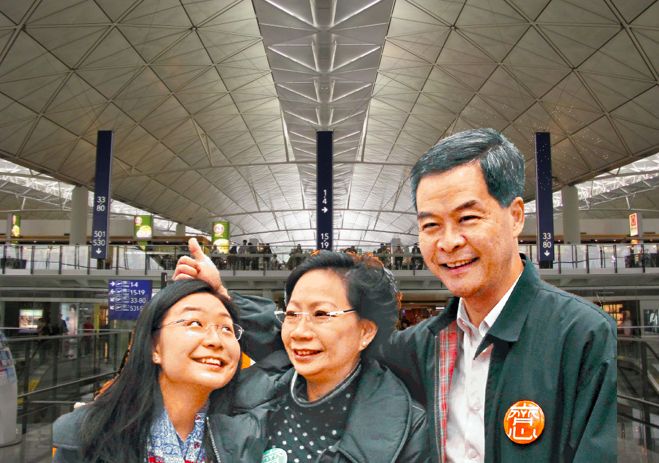My friend and I arrived at the front desk of a casual restaurant on the mezzanine floor of the Mandarin Oriental. There was a young couple standing in front of us. The maître d’ flashed a smile and led them down the long hallway into the dining hall. The restaurant didn’t look full, and so we waited our turn.
A few seconds later, two older women approached the restaurant and proceeded to stand right in front of us. They blocked our way, like two secret service agents ready to take a bullet for us if someone pulls out a gun. They showed no interest in making eye contact or acknowledging our presence. It was as if we were invisible to them.

One of the women was hard to miss. She was Regina Ip, a senior member in C.Y. Leung’s cabinet and a divisive figure in local politics best known for her role in pushing a controversial anti-subversion bill in 2003. The bill failed, she resigned, and so did her then boss Tung Chee-hwa.
I decided not to make a fuss, for two reasons. First, I wanted to give Ip the benefit of the doubt. It was entirely possible that she just wanted to look for her friends who had already been given a table.
Second, I wanted to know if Ip would avoid the rookie mistake of behaving like a swaggering politician. After C.Y. Leung’s now-infamous “bag-gate” incident – the chief executive allegedly pressured airport staff to deliver a forgotten bag to his daughter at the boarding gate in violation of security protocols – it would be far too easy, almost stereotypical, to assume that all self-important government officials act above the law – and basic social etiquette.
And so I waited. Meanwhile, my friend Jeremy, who isn’t from around here, had no idea who this woman with an aggressive hairdo was. He started to give me looks, amused by the queue-jumpers.

A few more seconds later, the maître d’ – an impossibly gracious Eurasian woman – returned.
The moment of truth.
The maître d’ walked behind the counter and smiled to me and my friend. I smiled back and said, “For two, pleas….” I hadn’t even finished my sentence when Ip’s female companion lunged forward and made a “V” sign. “Table for two!” she growled.
“Is this woman for real?” Jeremy protested.
Confused, the maître d’ asked politely, “I’m sorry, but who got here first?”
“We did,” I said, giving a slight head tilt.
“But you see, we called the restaurant to let them know we were coming,” Ip finally spoke. I turned and stared at her, transfixed by her warped logic.
Ip saw the look on my face and said, “We really did, you can ask the restaurant!”
I believed her. But it wasn’t the point.
“It doesn’t matter,” she conceded, “You two can go in front of us.”
“No, no, you two go ahead. It doesn’t matter to us either,” I countered, rejecting an offer that implied I was the one who had cut the line.
By then, the maître d’ had heard enough testimony from both plaintiffs and defendants. She must handle this kind of minor disputes several times a day.
“Right this way, gentlemen,” the maître d’ returned a verdict.
As she walked us down the hallway, the maître d’ furrowed her eyebrows and said, “I am really sorry about what just happened.” I wasn’t sure whether the half-Caucasian staffer had recognized Ip, but she wanted to apologize for her just the same.
“It’s not your fault,” Jeremy replied. He then turned to me and said, “Those two need to learn some manners and wait in line like everyone else!”
“Did you know who the taller woman was?” I asked my friend, before giving him a three-minute crash course on local politics.
“I don’t care if she was Michelle Obama!” Jeremy quipped. “Is that how things work in Hong Kong? Do all politicians think they don’t need to follow the rules?”

That last question plunged me into deep thought. Jeremy might not know much about local politicians, but his remark summed up their holier-than-thou attitude rather accurately, even over an incident that seemed so insignificant.
I wasn’t angry with Ip. During our 60-second encounter, she was never rude – her companion was – but she wasn’t. She might have even passed for a nice lady. She was careful to avoid clichés like “Do you know who I am?” or “Manager! I need to speak to the manager!” – as so many of her peers would or could have said if placed in a similar situation. Even if she had thought it, she was smart enough not to say it.
Instead, I felt bad for her. As much as I disagree with her political stance, Ip has a lot going for her. Her public service experience, education credentials and willingness to play ball with Beijing make her a formidable contender for the Government House.
In the end, however, it won’t be her politics (she is an unabashed Beijing loyalist), or her naked ambition (she makes no secret of her aspirations for the top job), or even her superiority complex (she has been caught on camera giving reporters and service people a hard time) that will do her in. She is guilty on all three counts, of course, but none of them is politically fatal.
Her Achilles’ heel is her tone deafness, which explains why she has called foreign domestic workers seductresses of married men, compared wearing animal fur to eating meat, proposed to lock up asylum seekers in detention camps, and believed restaurant lines don’t apply to her if only she gives the manager a heads-up. She honestly believes she is right, convinced by twisted reasoning that makes sense only to her but that fails the most elementary of sanity checks.
For decades, she has been living in a bubble, surrounded by hand-shakers and brown-nosers at her beck and call – like her lunch companion who had no qualms about riding on her coattails to reap even the smallest advantage in life. Over time, she loses the common touch, and so goes the common sense.

If and when she decides to throw her hat into the ring, Ip won’t be running against other hopefuls like John Tsang or Carrie Lam – she will be running against herself. And that’s the toughest battle in the world.
